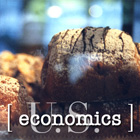
| UNEMPLOYMENT RISING 2 May 2003 Today it was announced that unemployment has hit 6%. More than half a million jobs have been lost in the last three months. This is reportedly the largest job loss ever not officially occurring within a recession. This has stirred fears that the economy is not in recovery, as well as widespread skepticism about the government's attempts to stimulate growth. Many are beginning to question the methods chosen by elected officials to manage the economy, and others are questioning the will of Congress to act to curb further losses. The president is proposing tax cuts which he says will result in a massive expansion of the job market, but economists, politicians and citizens from across the spectrum question whether these particular tax policies even target the job-creating mechanisms in domestic trade. Some who wish to make a simple and easily reproduced critique have argued that giving free money to those with the most will not of itself spur them to distribute it to those with less, by creating jobs. The reasons behind this simplified analysis are complex and bear evidentiary weight. For one, it has historically been true that there is a lag-time between such cuts and the generation of large numbers of new jobs, a sign that the cuts themselves don't spur job creation, but rather the slow accumulation of new capital in the hands of those who lacked disposable income, essentially, that jobs came when the economy recovered, on its own. Another reason behind the skeptics' view is that the current problem shows a strange refusal of the marketplace to keep individual salaries increasing at the rate of prices, putting most people further behind the market curve than those businesses which stand to benefit from the proposed cuts. It remains to be seen what will be done and whom it will help.
9 May 2003 Current debate regarding tax policy and its capacity to stimulate growth has revolved primarily around the president's tax plan. Though proponents of the plan have artfully avoided the term "supply-side economics", the plan is considered by many to be one of the most directly supply-side proposals in memory, giving most of the breaks to those who control the reins —and the purse-strings— of the nation's industrial production —supply— capacity. [Full Story] |
|||||||
|
||||||||

